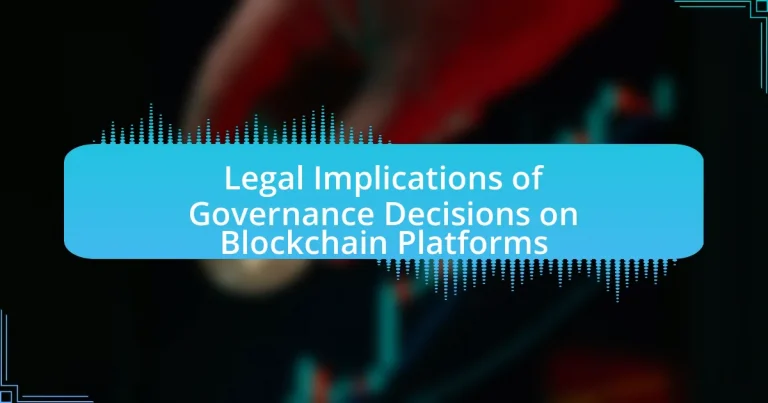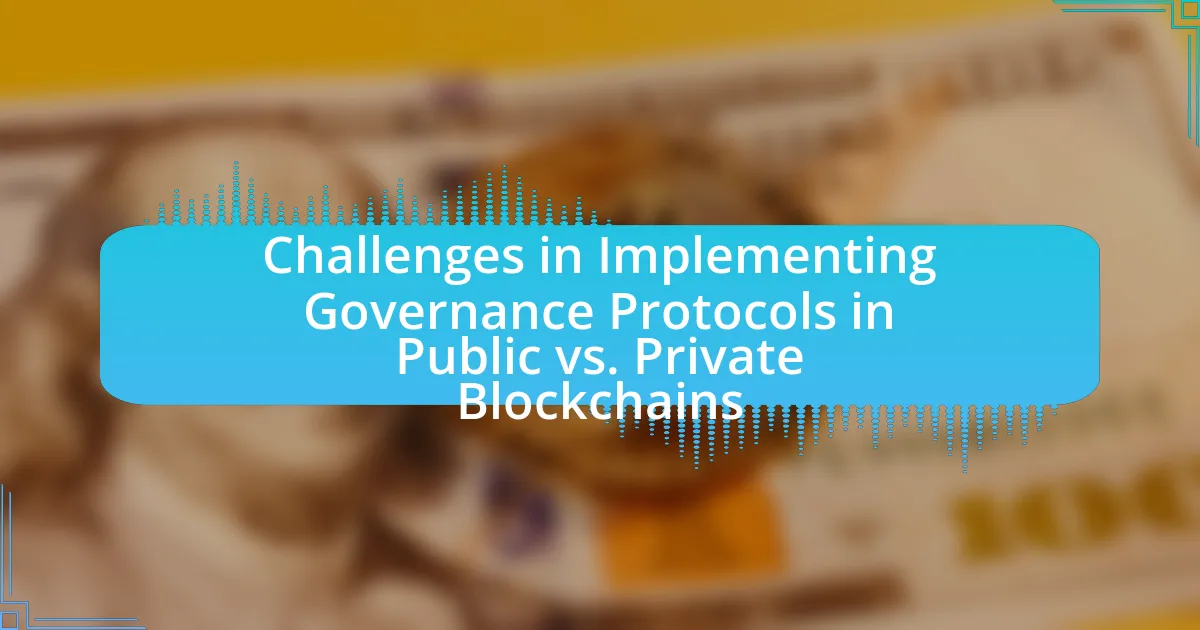The article examines the legal implications of governance decisions on blockchain platforms, focusing on regulatory compliance, liability, and contract enforceability. It highlights the complexities arising from decentralized governance structures, which complicate accountability and legal interpretations, particularly in light of varying regulations across jurisdictions. Key challenges include compliance with data protection laws, the classification of governance tokens under securities regulations, and the impact of international laws on blockchain operations. The article also outlines best practices for legal compliance, emphasizing the importance of transparency, stakeholder engagement, and regular audits to mitigate legal risks in blockchain governance.
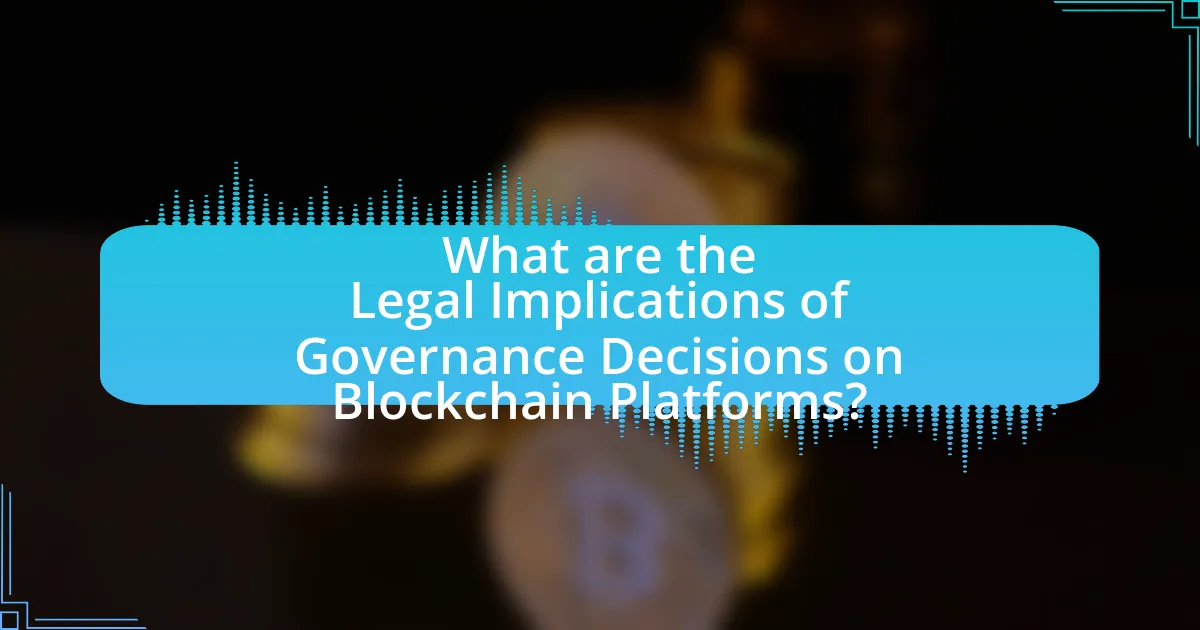
What are the Legal Implications of Governance Decisions on Blockchain Platforms?
Governance decisions on blockchain platforms have significant legal implications, primarily concerning regulatory compliance, liability, and contract enforceability. These platforms often operate in a decentralized manner, which complicates the identification of responsible parties in case of disputes or regulatory breaches. For instance, decisions made by a decentralized autonomous organization (DAO) can lead to questions about the legal status of its members and the enforceability of smart contracts, as seen in the 2016 DAO hack, where legal authorities scrutinized the responsibilities of the developers and investors involved. Additionally, jurisdictions may impose varying regulations on blockchain governance, affecting how decisions are made and executed, as evidenced by differing approaches in the European Union and the United States regarding cryptocurrency regulations.
How do governance decisions impact legal frameworks in blockchain technology?
Governance decisions significantly impact legal frameworks in blockchain technology by shaping the rules and protocols that govern the operation and compliance of blockchain networks. These decisions determine how a blockchain is managed, including aspects such as consensus mechanisms, user rights, and dispute resolution processes, which in turn influence regulatory compliance and legal interpretations. For instance, the governance structure of a blockchain can dictate whether it is classified as a security or a utility, affecting its regulatory obligations under laws such as the Securities Act in the United States. Additionally, governance decisions can lead to the establishment of smart contracts that automate legal agreements, thereby creating enforceable obligations that must align with existing legal standards. This interplay between governance and legal frameworks is crucial, as it can either facilitate innovation or create barriers depending on how governance is structured and implemented.
What specific legal challenges arise from governance structures in blockchain?
Governance structures in blockchain face specific legal challenges, including regulatory compliance, liability issues, and the enforcement of smart contracts. Regulatory compliance is complicated due to the decentralized nature of blockchain, which often leads to ambiguity regarding which jurisdiction’s laws apply. For instance, the lack of clear regulations can result in conflicts with existing financial laws, as seen in cases involving Initial Coin Offerings (ICOs) that have faced scrutiny from regulatory bodies like the SEC in the United States. Liability issues arise when governance decisions lead to financial losses or breaches of contract, raising questions about who is accountable—the developers, the users, or the governance participants. Additionally, the enforcement of smart contracts can be legally problematic, as traditional legal systems may not recognize or enforce these automated agreements, leading to disputes over contract interpretation and execution. These challenges highlight the need for clearer legal frameworks to address the unique characteristics of blockchain governance.
How do different governance models affect compliance with existing laws?
Different governance models significantly influence compliance with existing laws by determining how decisions are made and enforced within an organization. For instance, centralized governance models often lead to clearer accountability and streamlined compliance processes, as a single authority can enforce regulations more effectively. In contrast, decentralized governance models may result in varied interpretations of laws and inconsistent compliance, as multiple stakeholders may have differing priorities and levels of commitment to legal adherence. Research indicates that organizations with centralized governance structures report higher compliance rates, as evidenced by a study published in the Journal of Business Ethics, which found that firms with centralized decision-making processes had a 30% higher compliance rate with regulatory requirements compared to those with decentralized models.
Why is understanding legal implications crucial for blockchain governance?
Understanding legal implications is crucial for blockchain governance because it ensures compliance with existing laws and regulations, thereby mitigating risks associated with legal liabilities. Blockchain platforms operate in a complex legal landscape that includes data protection laws, financial regulations, and intellectual property rights. For instance, the General Data Protection Regulation (GDPR) in the European Union imposes strict rules on data handling, which can significantly impact how blockchain systems manage user data. Failure to adhere to these legal frameworks can result in substantial fines and reputational damage. Therefore, a comprehensive understanding of legal implications enables blockchain governance structures to make informed decisions that align with regulatory requirements, ultimately fostering trust and sustainability in the ecosystem.
What risks do organizations face without legal clarity in governance decisions?
Organizations face significant risks without legal clarity in governance decisions, including potential legal liabilities, regulatory penalties, and reputational damage. The absence of clear legal guidelines can lead to misinterpretations of laws, resulting in non-compliance with regulations such as the General Data Protection Regulation (GDPR) or the Securities and Exchange Commission (SEC) rules. For instance, a lack of clarity may cause organizations to inadvertently engage in activities that violate securities laws, leading to fines or legal action. Furthermore, unclear governance can create internal conflicts and decision-making paralysis, undermining operational efficiency and stakeholder trust. These risks highlight the critical need for well-defined legal frameworks to guide governance in blockchain platforms.
How can legal implications influence stakeholder trust in blockchain platforms?
Legal implications significantly influence stakeholder trust in blockchain platforms by establishing a framework of accountability and compliance. When stakeholders perceive that a blockchain platform adheres to legal standards, such as data protection regulations and anti-money laundering laws, their confidence in the platform’s integrity and reliability increases. For instance, the General Data Protection Regulation (GDPR) in Europe mandates strict data handling practices, and platforms that comply with these regulations demonstrate a commitment to protecting user privacy, thereby enhancing trust. Conversely, platforms that lack legal clarity or face regulatory scrutiny may lead stakeholders to question their legitimacy and security, ultimately diminishing trust.
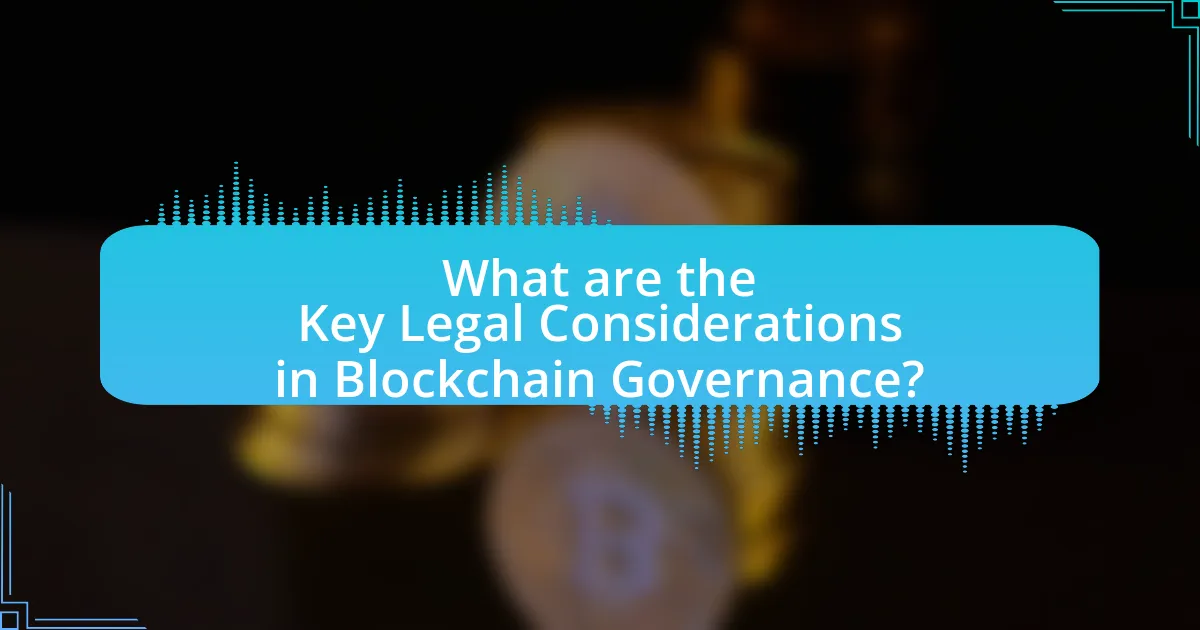
What are the Key Legal Considerations in Blockchain Governance?
Key legal considerations in blockchain governance include regulatory compliance, data privacy, intellectual property rights, and liability issues. Regulatory compliance is crucial as blockchain platforms must adhere to laws such as anti-money laundering (AML) and know your customer (KYC) regulations, which vary by jurisdiction. Data privacy laws, like the General Data Protection Regulation (GDPR) in Europe, impact how personal data is handled on blockchain networks. Intellectual property rights are significant as they determine ownership of digital assets and smart contracts. Liability issues arise from the decentralized nature of blockchain, complicating accountability for actions taken on the platform. These considerations are essential for ensuring that blockchain governance aligns with existing legal frameworks and mitigates potential legal risks.
What types of regulations affect blockchain governance decisions?
Various types of regulations affect blockchain governance decisions, including securities regulations, anti-money laundering (AML) laws, and data protection regulations. Securities regulations, such as those enforced by the U.S. Securities and Exchange Commission (SEC), determine whether tokens are classified as securities, impacting how blockchain projects can raise funds. Anti-money laundering laws require blockchain platforms to implement Know Your Customer (KYC) processes, influencing governance structures to ensure compliance. Data protection regulations, like the General Data Protection Regulation (GDPR) in the European Union, impose requirements on how user data is handled, affecting governance decisions related to privacy and data management. These regulations collectively shape the operational frameworks and decision-making processes within blockchain governance.
How do securities laws apply to governance tokens in blockchain?
Securities laws apply to governance tokens in blockchain by determining whether these tokens qualify as securities under existing regulations. The U.S. Securities and Exchange Commission (SEC) uses the Howey Test to assess whether a token constitutes an investment contract, which would classify it as a security. This test evaluates if there is an investment of money in a common enterprise with an expectation of profits derived from the efforts of others. For instance, if governance tokens provide holders with voting rights that influence the project’s direction and are marketed with the promise of future profits, they may be deemed securities. This classification subjects the tokens to registration requirements and compliance with securities regulations, as seen in cases like the SEC’s action against Telegram for its Gram tokens.
What role do data protection laws play in blockchain governance?
Data protection laws play a crucial role in blockchain governance by establishing legal frameworks that dictate how personal data must be handled within blockchain systems. These laws, such as the General Data Protection Regulation (GDPR) in the European Union, require that organizations ensure data privacy and security, influencing how blockchain platforms design their protocols and manage user information. For instance, GDPR mandates that individuals have the right to access their data and request its deletion, which poses challenges for blockchain’s immutable nature. Compliance with these regulations necessitates the implementation of privacy-enhancing technologies and governance structures that can adapt to legal requirements, thereby shaping the operational and strategic decisions of blockchain entities.
How do international laws impact blockchain governance?
International laws significantly impact blockchain governance by establishing regulatory frameworks that dictate how blockchain technologies can be developed and utilized across borders. These laws influence compliance requirements, data privacy standards, and anti-money laundering measures, which blockchain platforms must adhere to in order to operate legally in various jurisdictions. For instance, the General Data Protection Regulation (GDPR) in the European Union imposes strict data handling and privacy obligations that affect how blockchain networks manage user data. Additionally, international treaties and agreements can shape the legal landscape for cryptocurrencies, affecting their acceptance and regulation in different countries. This interplay between international law and blockchain governance is crucial for ensuring that blockchain platforms operate within legal boundaries while fostering innovation.
What are the challenges of cross-border governance in blockchain platforms?
Cross-border governance in blockchain platforms faces significant challenges primarily due to differing regulatory frameworks across jurisdictions. These discrepancies can lead to legal ambiguities regarding compliance, data privacy, and consumer protection. For instance, the European Union’s General Data Protection Regulation (GDPR) imposes strict data handling requirements that may conflict with more lenient regulations in other regions, complicating the operation of blockchain networks that span multiple countries. Additionally, the lack of a unified legal framework for digital assets creates uncertainty for businesses operating internationally, as they must navigate varying laws on cryptocurrency, smart contracts, and intellectual property rights. This complexity can hinder innovation and investment in blockchain technology, as companies may be reluctant to engage in cross-border transactions without clear legal guidelines.
How do varying legal interpretations affect global blockchain operations?
Varying legal interpretations significantly impact global blockchain operations by creating uncertainty and inconsistency in compliance requirements across jurisdictions. Different countries may classify blockchain technology and its applications, such as cryptocurrencies, under varying legal frameworks, leading to divergent regulatory approaches. For instance, the United States treats cryptocurrencies as securities under certain conditions, while countries like El Salvador have adopted Bitcoin as legal tender. This inconsistency can hinder cross-border transactions, complicate international partnerships, and increase operational risks for blockchain companies. Furthermore, legal interpretations regarding data privacy, intellectual property, and anti-money laundering regulations can differ widely, affecting how blockchain platforms design their systems and conduct business globally.
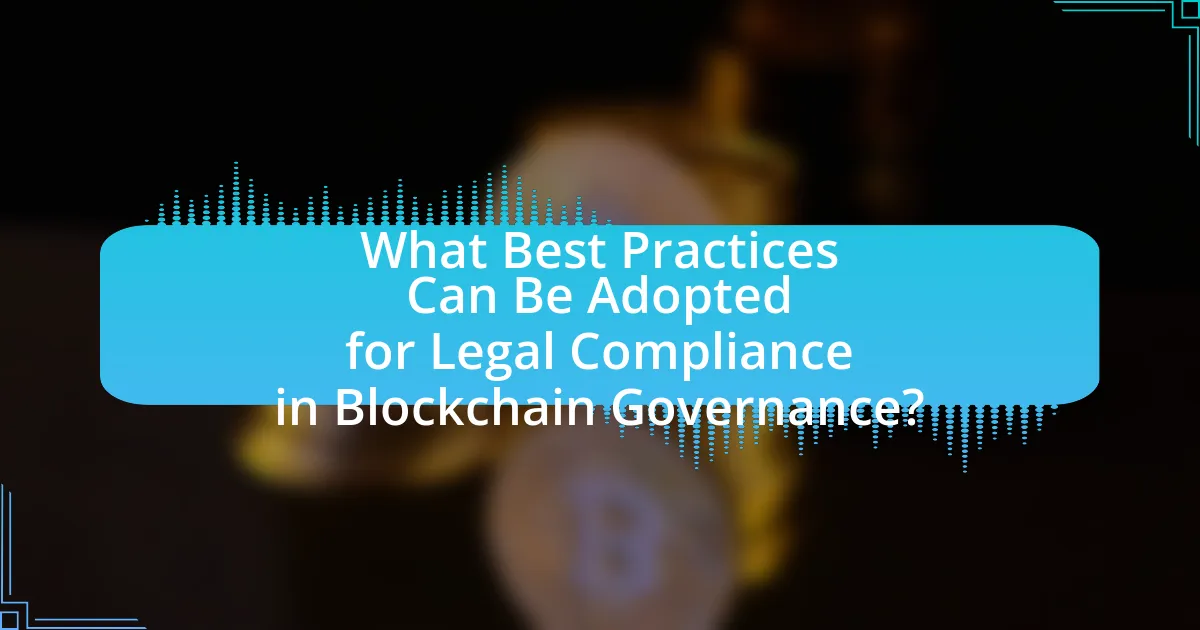
What Best Practices Can Be Adopted for Legal Compliance in Blockchain Governance?
Best practices for legal compliance in blockchain governance include implementing robust regulatory frameworks, ensuring transparency in operations, and conducting regular audits. Regulatory frameworks should align with existing laws, such as anti-money laundering (AML) and know your customer (KYC) regulations, to mitigate legal risks. Transparency can be achieved through clear documentation of governance processes and decision-making, which fosters trust and accountability. Regular audits, both internal and external, help identify compliance gaps and ensure adherence to legal standards. These practices are supported by the increasing emphasis on regulatory compliance in the blockchain industry, as evidenced by the growing number of jurisdictions establishing specific regulations for blockchain technology and cryptocurrencies.
How can organizations ensure compliance with legal standards in governance?
Organizations can ensure compliance with legal standards in governance by implementing robust compliance programs that include regular audits, training, and adherence to relevant regulations. These programs should be tailored to the specific legal frameworks applicable to their operations, such as data protection laws, financial regulations, and industry-specific guidelines. For instance, organizations operating on blockchain platforms must comply with regulations like the General Data Protection Regulation (GDPR) in Europe, which mandates strict data handling and privacy measures. Regularly updating compliance protocols in response to evolving legal standards and conducting risk assessments can further enhance adherence to governance requirements.
What frameworks can be implemented to navigate legal complexities?
To navigate legal complexities in blockchain governance, frameworks such as the Regulatory Sandbox, Legal Compliance Framework, and Smart Contract Auditing can be implemented. The Regulatory Sandbox allows for controlled testing of blockchain applications under regulatory oversight, facilitating innovation while ensuring compliance with existing laws. The Legal Compliance Framework provides guidelines for adhering to relevant regulations, such as data protection and financial laws, ensuring that blockchain projects operate within legal boundaries. Smart Contract Auditing involves reviewing and verifying the code of smart contracts to ensure they comply with legal standards and function as intended, reducing the risk of legal disputes. These frameworks collectively help organizations address the multifaceted legal challenges associated with blockchain technology.
How can regular audits enhance legal compliance in blockchain governance?
Regular audits enhance legal compliance in blockchain governance by systematically evaluating adherence to regulatory standards and internal policies. These audits identify discrepancies and areas of non-compliance, ensuring that blockchain operations align with legal requirements such as data protection laws and anti-money laundering regulations. For instance, a study by the European Union Agency for Cybersecurity highlights that regular audits can uncover vulnerabilities in smart contracts, which, if left unchecked, could lead to legal liabilities. By implementing a structured audit process, organizations can proactively address compliance issues, thereby reducing the risk of legal penalties and fostering trust among stakeholders.
What are the common pitfalls to avoid in blockchain governance decisions?
Common pitfalls to avoid in blockchain governance decisions include lack of stakeholder engagement, insufficient transparency, and inadequate legal compliance. Lack of stakeholder engagement can lead to decisions that do not reflect the interests of the community, resulting in decreased trust and participation. Insufficient transparency in governance processes can create confusion and suspicion among users, undermining the legitimacy of the governance framework. Inadequate legal compliance can expose the platform to regulatory risks, as seen in cases where blockchain projects faced legal challenges due to non-compliance with existing laws. These pitfalls highlight the importance of inclusive, transparent, and legally sound governance practices in blockchain platforms.
How can misinterpretation of laws lead to governance failures?
Misinterpretation of laws can lead to governance failures by causing decision-makers to implement policies that are not legally sound or aligned with regulatory frameworks. When laws are misinterpreted, it can result in actions that violate legal standards, leading to penalties, loss of public trust, and ineffective governance. For instance, in the case of blockchain platforms, if governance structures are established based on incorrect legal assumptions, it may lead to non-compliance with financial regulations, as seen in the SEC’s actions against companies that misclassified their tokens. This misalignment can hinder the platform’s operational integrity and sustainability, ultimately resulting in governance breakdowns.
What lessons can be learned from past governance failures in blockchain?
Past governance failures in blockchain highlight the importance of transparency, community engagement, and adaptability in decision-making processes. For instance, the DAO hack in 2016 demonstrated that insufficient security measures and lack of clear governance protocols can lead to significant financial losses and community distrust. This incident prompted the Ethereum community to implement more robust governance frameworks and improve security practices. Additionally, the governance issues faced by projects like Bitshares and Steemit illustrate the necessity for inclusive governance structures that consider diverse stakeholder interests to prevent centralization and ensure long-term sustainability. These examples underscore that effective governance in blockchain requires clear communication, stakeholder involvement, and the ability to adapt to emerging challenges.
What practical steps can organizations take to mitigate legal risks in blockchain governance?
Organizations can mitigate legal risks in blockchain governance by implementing comprehensive compliance frameworks. These frameworks should include regular audits to ensure adherence to relevant regulations, such as anti-money laundering (AML) and know your customer (KYC) laws, which are critical in the blockchain space. Additionally, organizations should establish clear governance structures that define roles and responsibilities, thereby reducing ambiguity and potential liability.
Furthermore, engaging legal experts to review smart contracts and governance protocols can help identify and rectify potential legal vulnerabilities before they lead to disputes. Training employees on legal compliance and the implications of blockchain technology is also essential, as informed staff can better navigate the complexities of the legal landscape.
Lastly, organizations should actively monitor regulatory developments in the blockchain sector, as laws and regulations are continually evolving. By staying informed, organizations can adapt their governance practices proactively, thereby minimizing legal risks associated with blockchain operations.












